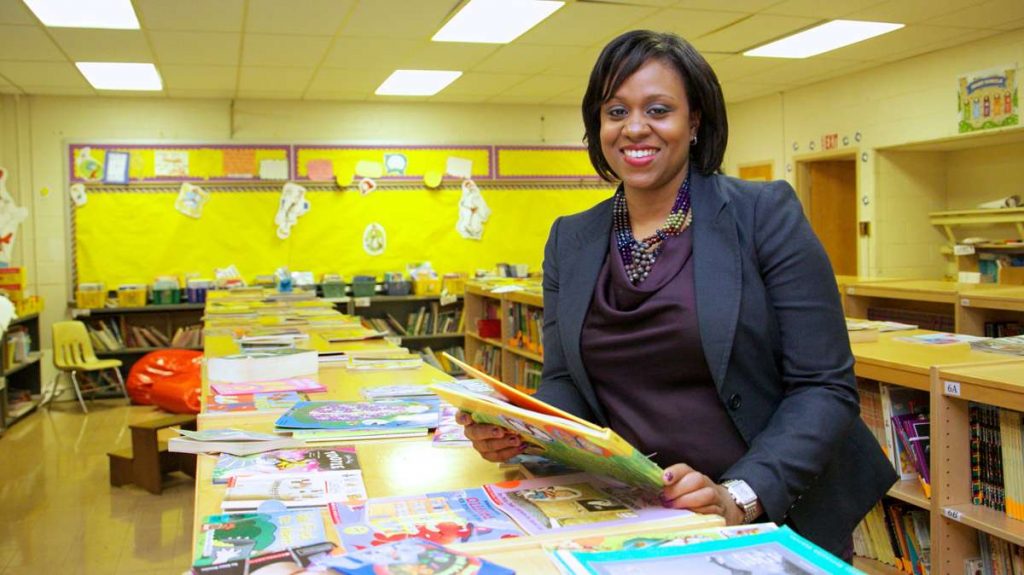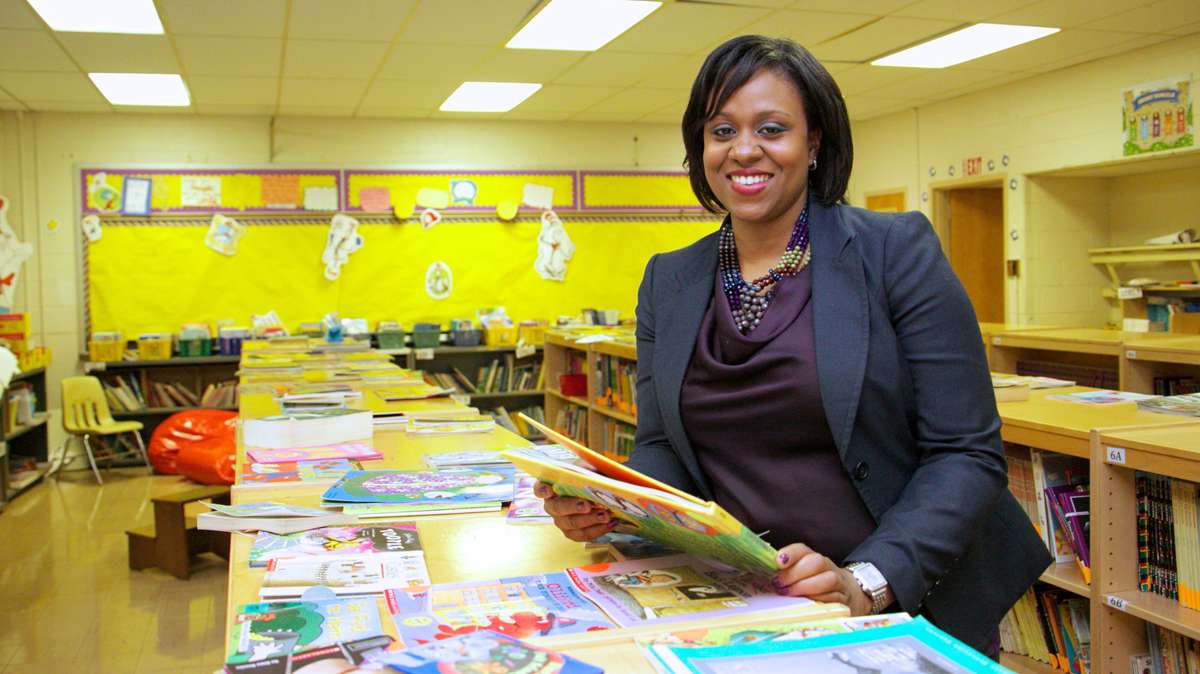At 6 AM on a recent Tuesday morning—before coffee, before her two kids awoke, before she’d even considered what to wear to work that day—Gianeen Powell had a new job. The principal of James G. Blaine Elementary School in Strawberry Mansion, Powell’s day started, as it started and ended every day, with a quick check of her email.
That’s when she learned that her building engineer was going to be out because of a death in the family. Powell sent him a condolence note, then considered the new complication to her day. The school district would send over another engineer, as needed. But no one else among Powell’s small, stretched staff could ensure the building was open on time, the tables were set for lunch, the lights were on—all parts of his job. She would need to oversee his work, in addition to all the other roles she performs as principal: school nurse three days a week; guidance counselor three days a week; teacher instructor; class evaluator; parent communicator; community liaison; grant writer; student; cheerleader.

“I do what it takes to get the job done,” shrugs Powell, who talks about the challenges of her job with a wry glint. “It looks like a lot—and it is.”
Seven years ago, at just 30, Powell was hired to lead Blaine, a bedraggled, struggling school in a neighborhood fraught with poverty, blight and transience. Now, Blaine is one of two schools designated as a District transformation school, funded with a $1.5 million grant from the Philadelphia Schools Partnership. (The other is nearby William D. Kelley School, whose principal Amelia Coleman-Brown works closely with Powell.)
PSP selected Blaine almost entirely because of Powell. Jessica Peña, PSP’s Great Schools Fund Director, says the group was impressed by Powell’s focus on revving up the quality of teaching, and her talent for building a team of teachers, parents, community groups and others to create a plan for the school. Now, it is Powell’s ability as a school leader that will be put to the test over the next five years.
“The goal is for Blaine’s students to be doing as well as the kids in Lower Merion,” says Peña. “If you’re going to be successful and meet the needs of all the students, all the teachers, all the parents, and all in the community, you have to be able to do it all. No matter how daunting something is, Gianeen [Powell] seems willing and able to tackle it.”
Powell knows that transforming Blaine would be no small feat. Blaine suffers from all the ills that make urban education so difficult: 97 percent of the population is economically disadvantaged; 25 percent are special ed. When she arrived there in 2007, Blaine was among the lowest-performing schools in the District, with only 40 percent of students proficient in reading and math. Ambitions were stagnant. Powell says 8th graders in 2007 all assumed they would be attending nearby Strawberry Mansion High School, a catchall of last resort for students who don’t qualify for an admissions-based high school.
And teachers seemed similarly lackluster. “When I arrived, everyone was in survival mode,” Powell recalls. “Teachers were doing their own thing. They didn’t work together, or turn in lesson plans, or help each other with children who weren’t theirs. Everyone had their doors closed—literally and otherwise.”
“Just because they come from their socioeconomic situation doesn’t mean they should have fewer options for their future,” she says. “From the beginning, I pushed the idea of going to the high school of their choice, no matter what that is.”
Powell grew up in Stratford, Connecticut, a mostly-white, upper middle class suburb of New York, where she was one of few African Americans in her high school. “I had different things I had to deal with than my students,” she notes. She went to college at Temple, and then stayed in Philadelphia. (She now lives in Palmyra, New Jersey, with her two kids, 5 and 11.) She came to Blaine after three years as an assistant principal elsewhere, and set out right away to change the culture of the school, from opening classroom doors, to empowering certain teachers to be leaders, to holding workshops for parents on how best to help their kids learn. The work was hard, but Powell’s vision for the school was not: Simply put, she wanted every Blaine student to have a choice.
“Just because they come from their socioeconomic situation doesn’t mean they should have fewer options for their future,” she says. “From the beginning, I pushed the idea of going to the high school of their choice, no matter what that is.”
In her first three years at Blaine, the school saw a steady rise in student test scores, and then a slight dip for the next two years. (Last year, with the worst budget woes in recent memory, Powell was not able to bring in extra tutoring support for struggling students, and scores were even lower.) This is Year One of Blaine’s transformation, the baseline for everything that comes after. Still, it already looks different.
Powell has infused the school with a combination of core curriculum academics, and the sort of cultural strategies that pop up at charter schools. As part of planning for the transformation, Powell last year visited schools across the country, bringing home pieces of what she saw and turning them into the “Blaine Way.” From Chicago’s successful AUSL schools, for example, she took the idea of posting attendance outside every classroom and publicly setting an attendance goal for the school. She named classrooms for the colleges where teachers studied, the way KIPP and Mastery do. She went to Science Leadership Academy and the Workshop School, to see how project-based learning might apply to her elementary students. Now, she has instituted an afternoon STEM program for middle schoolers with (among other things) robotics and a LEGO club, and has used PSP money to buy 15 laptops for every class.
“Twenty years ago, no one was talking about teachers,” says Porter. “It was all about principals. That’s because principals determine what the learning environment will be, for teachers and students. They are the key to an effective school.”
Powell has made eight of her 32 teachers into “instructional leaders” who help her run the school. But she still has a hand in every single thing that happens at Blaine. Her weekly schedule, broken up by 15 minutes, starts every morning with the school’s 7:50 AM “Brain Breakfast,” and ends at 3:45 PM, when about two-thirds of students go home. (The rest stay for one of several after school programs.)
One week in October was typical: Every day, Powell met with her Title I and Special Ed coordinators; had several meetings with teachers and instructional leaders, including two hours of professional development on Wednesday afternoon. (Blaine’s school day ends at 12:30 every Wednesday for teacher training.) She attended a 5th grade parent workshop; a 6th to 8th grade community meeting; checked in with some of the 25 community groups who work with Blaine; had a budget meeting; submitted a school safety report to the District; and joined in school spirit activities, like the chanting of the school principles in the playground every morning.
The schedule includes four hours all week of what she calls “Unscheduled Time,” but which lists what she’ll be doing then: Classroom visits, program reviews, observations, prepping for meetings and check-ins with the counselor. Meanwhile, she carries a walkie-talkie and a cell phone with her everywhere, responding almost immediately to every one who reaches out. (“I can’t stand having 50 unread emails,” she says.)
The schedule doesn’t include the early morning hours, when Powell deals with teacher absences or other changes to the day, or late nights, when she gets back on her computer after putting her kids to bed. Nor does it include weekends.
“Amelia [Brown] and I kind of feel like outcasts at the principal meetings,” says Powell. “Oh, look at those two. People wonder why we get funding, and computers, and training. It’s because we work hard for it.”
It will take years to know whether Powell has lived up to her promise, and whether Blaine can, as Peña puts it “prepare students for success.” What is clear already is that not everyone has the talent or the capacity to work like Powell. It is hard to imagine how a principal with any less can actually succeed at turning around the city’s worst schools. The problem is how to find enough leaders like Powell to do the work.
“Extraordinary leaders are needed in schools that are extraordinarily poor in quality to turn them around,” says Andy Porter, dean of Penn’s Graduate School of Education, who has developed a principal evaluation tool used in 10 percent of American schools. “That is true of almost anything that is led by a person—a football team, or a corporation, or a school. The problem is, there aren’t that many extraordinary people out there.”
Powell seems to have understood instinctively how to fashion herself as a good school leader. From the District, she got a one-month crash course in how to be a Philly principal before starting at Blaine. She and Brown are currently enrolled in a principal training program at New York-based Relay Graduate School of Education—something Powell says she had to beg the District to pay for. While the District in Philly—and around the country—has fretted over teacher contracts, and teacher evaluations, attention has shifted away from principals, who have become, by necessity, more involved in every aspect of a school than ever before.
Now the Philadelphia School District seems to be upping its efforts to ensure city schools have better-prepared principals. This year, the “Office of Effectiveness” is holding monthly development seminars for city principals, and the District contracted with non-profit The New Teachers Project to help screen principal applicants for new posts. With support from PSP, TNTP is also in the second year of running PhillyPLUS, a principal fellowship that this year is training 32 Philly educators from public, charter and Catholic schools to be effective school leaders.
The fellows are currently serving as assistant principals in their schools, in the hopes of becoming principals there or elsewhere in 2015. This could mean a renewed focus on an old idea: That principals matter.
“Twenty years ago, no one was talking about teachers,” says Porter. “It was all about principals. That’s because principals determine what the learning environment will be, for teachers and students. They are the key to an effective school.”



